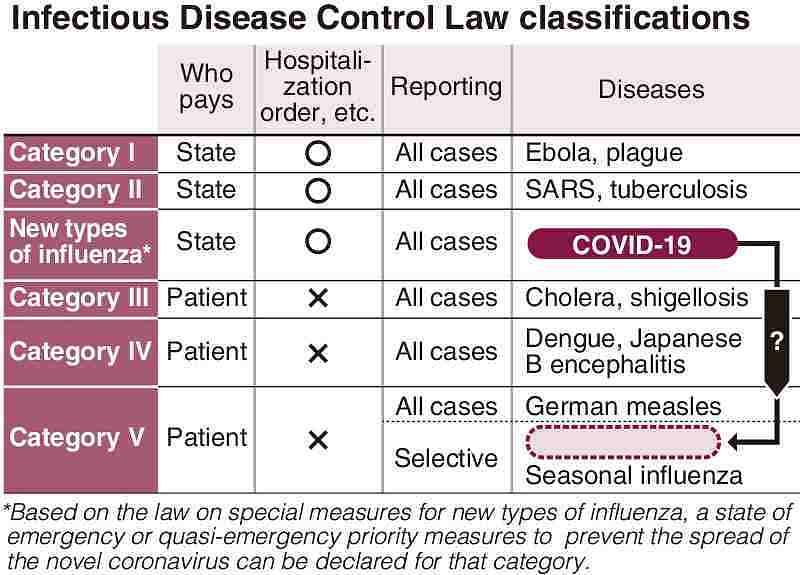
7:00 JST, December 16, 2022
The Infectious Disease Control Law has classifications from Category I to V in descending order of risk, with a separate slot stipulated for new types of influenza such as COVID-19 and new infectious diseases.
COVID-19 has so far been treated as equivalent to diseases in Category II, giving the government and prefectural governors strong authority to take measures to prevent infection, though the central government is considering downgrading it to Category V.
For Category II, governors have the authority to ask patients to recuperate at home. They can also issue issue hospitalization recommendations or orders to patients who are at high risk of serious illness.
Medical institutions are obliged to report to public health centers and other entities detailed information on all infection cases, such as the names of all infected patients, although currently the reporting system for COVID-19 has been relaxed.
Under the law on special measures for new types of influenza, the government can also implement strong measures such as declaring a state of emergency that places restrictions on activities.
During the COVID-19 pandemic, however, the workload on the health care system has been excessive, creating a challenge as only a limited number of medical institutions such as fever clinics designated by prefectures were able to treat patients.
In exchange for such strong measures being in place, COVID-19 medical expenses are fully covered by the state.
For Category V, which includes relatively low-risk diseases such as German measles and seasonal influenza, the central and local governments do not have great authority. They cannot, for example, issue hospitalization recommendations or orders, make requests for home recuperation, or take measures granted under the new types of influenza law.
Treatment costs for Categories III to V are not covered by the state, meaning that in principle patients have to pay out of pocket for expenses not covered by health insurance.
Since only designated medical institutions are required to report information on seasonal influenza and some other Category V diseases, the burden on medical institutions is relatively low.
Top Articles in Society
-

Man Infected with Measles Reportedly Dined at Restaurant in Tokyo Station
-

Man Infected with Measles May Have Come in Contact with Many People in Tokyo, Went to Store, Restaurant Around When Symptoms Emerged
-

Woman with Measles Visited Hospital in Tokyo Multiple Times Before Being Diagnosed with Disease
-

Australian Woman Dies After Mishap on Ski Lift in Nagano Prefecture
-

Foreign Snowboarder in Serious Condition After Hanging in Midair from Chairlift in Nagano Prefecture
JN ACCESS RANKING
-

Japan PM Takaichi’s Cabinet Resigns en Masse
-

Japan Institute to Use Domestic Commercial Optical Lattice Clock to Set Japan Standard Time
-

Israeli Ambassador to Japan Speaks about Japan’s Role in the Reconstruction of Gaza
-

Man Infected with Measles Reportedly Dined at Restaurant in Tokyo Station
-

Videos Plagiarized, Reposted with False Subtitles Claiming ‘Ryukyu Belongs to China’; Anti-China False Information Also Posted in Japan
























